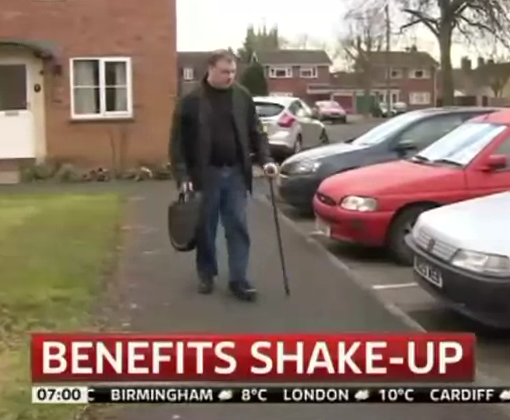I receive Disability Living Allowance. DLA provides help for people who are disabled to live a normal life on a more equal footing. DLA provides two components, care and mobility, that pay for carers, cars, wheelchairs, but also taxi fares, pre-prepared food, adaptations for the home, and many more things. I asked people on Twitter what they use their DLA for and you can read their answers on Storify.
The Welfare Reform Act replaces DLA with Personal Independence Payments. Under PIP eligibility for the highest rate of help with mobility has been drastically reduced, from 50 metres to 20 metres and I fall right in the middle of those two. If I do not qualify for the enhanced rate of mobility then the biggest change is that I will no longer be eligible to lease a car from the Motability scheme. That means that I will have to rely on my wheelchair and public transport for every trip to the shops, to the doctor, to the hospital, and that means that every trip will turn into an far longer ordeal of exhaustion and pain that will leave me stuck in bed for hours or days afterwards. It means that I will only go out for the essential trips and will stay isolated the rest of the time and that will affect both my physical and my mental health. DLA is paid to disabled people regardless of whether they work or not, and in fact it enables a lot of people to get to work. If I were ever to return to work then it would be the help from DLA that got me there. Without it, I don’t stand a chance.
I am one of three people, likely to be badly affected by the change, that is taking the government to court and asking for a judicial review to declare the consultation invalid.
Jane Young of wearespartacus.co.uk did a huge amount of work to start the legal action, finding lawyers to take the case pro bono, finding people willing to put themselves in the firing line and put their name to the case. A call for volunteers was made through blogs and social media (Social media being a lifeline for isolated sick and disabled people) and lawyers picked those with the best case from about 50 volunteers. Although I volunteered early on I was not initially involved until one of the other people withdrew for personal reasons. This meant that I was brought in to the process at a late stage and had to rush through the paperwork. Even with a solicitor doing most of the work I had to work with her over the phone to produce my statement and I had to read and sign an awful lot of pages, each of which had to be emailed, printed, signed, scanned and both posted and emailed back because of time constraints. All very draining stuff for a sick person.
Some have criticised us because the legal case focuses on one part of PIP and didn’t cover mental health, among other things. Believe me, if I could have taken the government to task over all the other aspects of PIP I would have done. (Not least because I have mental health problems myself.) As it happens I was in the right place at the right time to take on this particular aspect and so that is what I have done. Unfortunately it isn’t possible to just go to court and tell them that PIP is rubbish, we had to specify exactly how the law was broken and attacking just this one aspect has been a lot of work for the people involved.
If we are successful in the judicial review then the consultation will have to start all over again with the 20 metre limit rather than the 50 metres mentioned in the first consultation. However, given the arrogance of the government I see no reason why they would pay attention to a new consultation any more than they paid attention to the one that they already did. I see this judicial review as a tool to give time to shine a spotlight on the injustice of PIP and bring attention to the arrogance of the government rather than the ultimate goal in itself. I think it will be public pressure that will change this policy, and the judicial review could be instrumental in bringing that about. I believe the best result would be if the government dropped PIP and kept DLA.
My solicitor, Karen Ashton from Public Law Solicitors explained the legal case to BBC West Midlands:
[audio:http://latentexistence.me.uk/media/20130409-Karen_Ashton-PIP-BBCWM.mp3]For the official press release and contact details for enquiries please see my announcement about the case.


